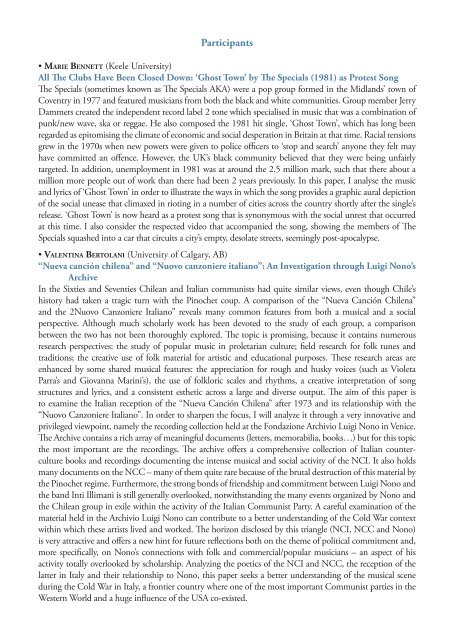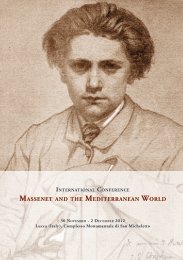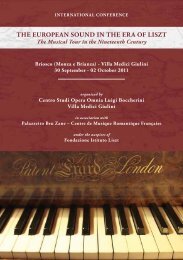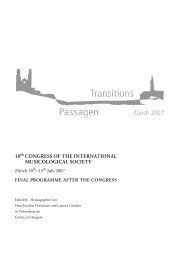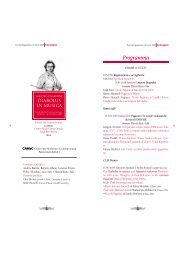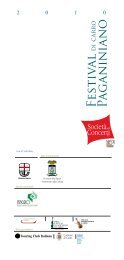PROGRAMME - Centro Studi Opera Omnia Luigi Boccherini
PROGRAMME - Centro Studi Opera Omnia Luigi Boccherini
PROGRAMME - Centro Studi Opera Omnia Luigi Boccherini
Create successful ePaper yourself
Turn your PDF publications into a flip-book with our unique Google optimized e-Paper software.
Participants• Marie Bennett (Keele University)All The Clubs Have Been Closed Down: ‘Ghost Town’ by The Specials (1981) as Protest SongThe Specials (sometimes known as The Specials AKA) were a pop group formed in the Midlands’ town ofCoventry in 1977 and featured musicians from both the black and white communities. Group member JerryDammers created the independent record label 2 tone which specialised in music that was a combination ofpunk/new wave, ska or reggae. He also composed the 1981 hit single, ‘Ghost Town’, which has long beenregarded as epitomising the climate of economic and social desperation in Britain at that time. Racial tensionsgrew in the 1970s when new powers were given to police officers to ‘stop and search’ anyone they felt mayhave committed an offence. However, the UK’s black community believed that they were being unfairlytargeted. In addition, unemployment in 1981 was at around the 2.5 million mark, such that there about amillion more people out of work than there had been 2 years previously. In this paper, I analyse the musicand lyrics of ‘Ghost Town’ in order to illustrate the ways in which the song provides a graphic aural depictionof the social unease that climaxed in rioting in a number of cities across the country shortly after the single’srelease. ‘Ghost Town’ is now heard as a protest song that is synonymous with the social unrest that occurredat this time. I also consider the respected video that accompanied the song, showing the members of TheSpecials squashed into a car that circuits a city’s empty, desolate streets, seemingly post-apocalypse.• Valentina Bertolani (University of Calgary, AB)“Nueva canción chilena” and “Nuovo canzoniere italiano”: An Investigation through <strong>Luigi</strong> Nono’sArchiveIn the Sixties and Seventies Chilean and Italian communists had quite similar views, even though Chile’shistory had taken a tragic turn with the Pinochet coup. A comparison of the “Nueva Canción Chilena”and the 2Nuovo Canzoniere Italiano” reveals many common features from both a musical and a socialperspective. Although much scholarly work has been devoted to the study of each group, a comparisonbetween the two has not been thoroughly explored. The topic is promising, because it contains numerousresearch perspectives: the study of popular music in proletarian culture; field research for folk tunes andtraditions; the creative use of folk material for artistic and educational purposes. These research areas areenhanced by some shared musical features: the appreciation for rough and husky voices (such as VioletaParra’s and Giovanna Marini’s), the use of folkloric scales and rhythms, a creative interpretation of songstructures and lyrics, and a consistent esthetic across a large and diverse output. The aim of this paper isto examine the Italian reception of the “Nueva Canción Chilena” after 1973 and its relationship with the“Nuovo Canzoniere Italiano”. In order to sharpen the focus, I will analyze it through a very innovative andprivileged viewpoint, namely the recording collection held at the Fondazione Archivio <strong>Luigi</strong> Nono in Venice.The Archive contains a rich array of meaningful documents (letters, memorabilia, books…) but for this topicthe most important are the recordings. The archive offers a comprehensive collection of Italian counterculturebooks and recordings documenting the intense musical and social activity of the NCI. It also holdsmany documents on the NCC – many of them quite rare because of the brutal destruction of this material bythe Pinochet regime. Furthermore, the strong bonds of friendship and commitment between <strong>Luigi</strong> Nono andthe band Inti Illimani is still generally overlooked, notwithstanding the many events organized by Nono andthe Chilean group in exile within the activity of the Italian Communist Party. A careful examination of thematerial held in the Archivio <strong>Luigi</strong> Nono can contribute to a better understanding of the Cold War contextwithin which these artists lived and worked. The horizon disclosed by this triangle (NCI, NCC and Nono)is very attractive and offers a new hint for future reflections both on the theme of political commitment and,more specifically, on Nono’s connections with folk and commercial/popular musicians – an aspect of hisactivity totally overlooked by scholarship. Analyzing the poetics of the NCI and NCC, the reception of thelatter in Italy and their relationship to Nono, this paper seeks a better understanding of the musical sceneduring the Cold War in Italy, a frontier country where one of the most important Communist parties in theWestern World and a huge influence of the USA co-existed.


